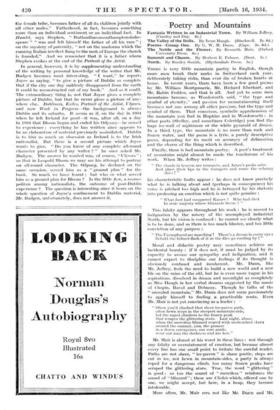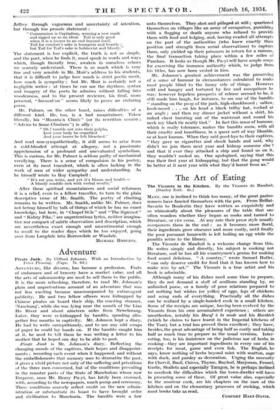Poetry and Mountains
University Press. 6s.)
THERE is very little mountain poetry in English, though more men break their necks in Switzerland each year, deliberately taking risks, than ever die of broken hearts at home. In recent years, there have been a few good poems by Mr. William Montgomerie, Mr. Richard Eberhart, and Mr. Robin Fedden, and that is all. And yet to some men mountains - become, as Words*orth said, " the type and symbol of eternity," and passion for mountaineering itself becomes not one among all other pass:ons, but the type and
symbol of them. That conscious, symbolic apprehension Of the mountain you find in Hopkins and in Wordsworth : in other poets (Shelley, .and sometimes Coleridge) you find the huge ice-wall of nightmare or the white pyramid of dream. In a third type, the mountain is no more than rock and frozen water, and the poem is a lyric, a purely descriptive poem, depending for its merit on accuracy of delineation and the charm of the thing which is 'described.
Finally, there is bad mountain poetry. A poet's treatment of mountains might almost be made the touchstone of his work. When Mr. Jeffrey writes :
" The clouds in heaven are trumpets, and Arran's peaks arise And place their lips to the trumpets and rouse the echoing skies !
his characteristic faults appear : he does not know precisely what he is talking about and (perhaps in consequence) his voice is pitched too high and he is betrayed by his rhetoric into professing an emotion which is not quite genuine :
" What foot had conquered Kamet ? Who had died In stoic majesty where blizzards freeze "
This falsity appears throughout his work : he is moved to indignation by the misery of the unemployed industrial North, but his vision is confused : he cannot see clearly what is to be done, and so there is too much bluster, and too little conviction of any purpose :
" The Unemployed are marching ! There's a dream in every eye : Behold the helmet-flash of it as the files go rustling by ! '
Moral' and didactic poetry may sometimes achieve an incidental beauty : if. it does not, it must be judged by its capacity to arouse our sympathy and indignation, and it
cannot expect to discipline our feelings if its thought is obviously confused and incoherent. Mr. Dunn, like Mr. Jeffrey, feels the need to build a new world and a new life on the ruins of the old, but he is even more vague in his aspirations, dissolved in dreana and moonlight as completely as Miss Haugh in her verbal dreams suggested by the music of Chopin, Ravel and Debussy. Though he talks of the " unsealed mountain," Mr. Dunn does not seem passionately to apply himself to finding . a practicable route. Even Mr. Muir is not yet convincing as a leader :
" Often you'd climbed that sheer ice-paven path, often hewn stops in the steepeAt mountain-side, led the roped climbers to the frozen peak that scrapes the glittering stars. Last night, alone, when the merciless blizzard roared with unsheathed claws around the summit, you, the pioneer in a dozen enterprises, our sure guide, went out into the darkness and are lost."
Mr. Muir is almost at his worst in these lines : not through any falsity or overstatement of emotion, but because almost every line has one small point to irritate the careful reader. Paths are not sheer, " ice-paven " is sham poetic, steps are cut in ice, not hewn in mountain-sides, a party is always roped for a dangerous climb, too many frozen peaks have scraped the 'glittering stars.' True, the word " glittering " is good : so too the sound of " merciless " reinforces the sound of "blizzard"; these are Clichés which, offered one by
one, we might accept, but here, in a heap, they become intolerable.
More often, Mr. Muir errs not like Mr. Dunn and Mi. Jeffrey through vagueness and uncertainty of intention, but through too prosaic statement :
" Communism is Capitalism, wearing a new mask and rigged up as an ideal. Toil is only good when it is a means to an end beyond itself. Toil for comfort's sake is bourgeois and beastly ; - but Toil for Toil's sake is bolshevist and bloody."
The statement is too explicit, the truth is not so simple, and the poet, when he finds it, must speak in words and ways
which, though literally true, awaken in ourselves echoes we scarcely understand. There is so much which is very fine and very sensible in Mr. Muir's address to his students, that 'it is difficult to judge how much is strict poetic merit, how much is sympathy ; but Mr. Muir is certainly not a negligible writer : at times he can use the rhythms, syntax and imagery of the poets he admires without falling into woodenness, and to the present reviewer, his final, more personal, "Invocation" seems likely to prove an enduring poem.
Mr. Palmer, on the other hand, raises difficulties of a different kind. He, too, is a bad mountaineer. Taken literally, his "Mounta'n Climb" (or its rewritten version "Advice to Some Climbers ") is silly :
" Oh ! tumble not into their gulphs, Lest your body be crumbled And your bones be left bleached."
And read non-sympathetically, it still seems to arise from a cold-blooded attempt at allegory, not a passionate apprehension of a profound and unevaluated symbolism. This is curious, for Mr. Palmer is seldom guilty of mechanical versifying. There is a sense of compulsion in his poetry, even at its most truculent, which is often lacking in the work of men of wider sympathy and understanding. As he himself wrote to Roy Campbell : - " It's rot you write, and yet it's bloom and health— A bloody muddle rich with verbal wealth."
After these spiritual mountaineers and social reformers it is a relief, even to a fellow traveller, to turn to the plain descriptive verse of Mr. Snaith. The poetry of climbing remains to be written. Mr. Smith, unlike Mr. Palmer, does not betray himself by talk of things of which he has no exact knowledge, but here, in "Chapel' Stile" and "The Signpost" and " Kidsty Pike," are unpretentious lyrics, neither imagina- tive nor compact of subtle observation and description, which are nevertheless exact enough and unsentimental enough to recall to the reader days which he too enjoyed, going over from Langdale into Borrowdale or Wasdale.
MICHAEL ROBERTS.











































 Previous page
Previous page